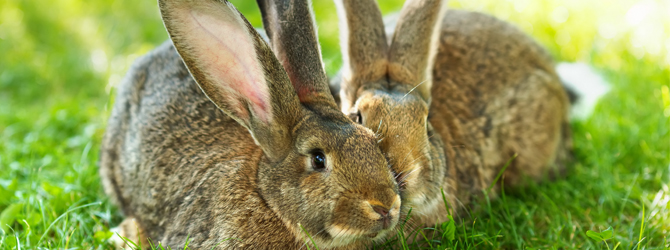Rabbit neutering: preventing rabbit reproduction
First Published: 06/03/2019
Last Updated: 10/02/2023
Rabbits are very sociable animals that, despite loving their owners very much, thrive in the company of other bunnies.
This stems from how they work in the wild: living in large groups and working together to warn one another of predators.
Because you really ought to have at least 2 bunnies, and because the best and most hassle-free option is to have one male and one female, you’re really going to want to have your bunnies neutered.
Benefits of rabbit neutering
No risk of pregnancy: You’re happy with your 2 bunnies and don’t wish to add more to the household. Rabbit spays and castration eliminate this risk, along with any pregnancy and birth-related trouble for females.
Decreases risk of cancer: Female bunnies are prone to cancer of the womb and breast tissue. Neutering them when they’re young is a proven method of lowering this risk. In fact, cancer of the womb can occur in up to 60% of un-neutered female rabbits over the age of 3.
A better relationship between bunnies: A male-female pairing will run a lot smoother if neither party has sex/breeding-related impulses to deal with
A better relationship with you: Just as with cats and dogs, rabbit neutering is a useful method of curbing aggressive behaviour, making your bunnies easier to handle, to house-train and safer to be around – which is especially important if you have children.
Read More: Is a rabbit the right pet for me?
Read More: How to litter train your rabbit?
Rabbits spays/rabbit castrations: the procedure
A rabbit castration involves the surgical removal of the testicles, a rabbit spay involves the removal of the ovaries and the womb. Both procedures render the bunny unable to reproduce and likewise, they will both involve anaesthetic.
The procedure for both a rabbit spay and a rabbit castration usually takes one day: your bunny will arrive in the morning and you’ll take them home in the evening. Unlike the procedure for cats and dogs, you should not starve your bunny before bringing them in for anaesthetic.
With the aid of pain relief (prescribed by your vet), neutered rabbits usually recover quickly – most are back to their usual self on the same day, although it’s nothing to worry about if your bunny is subdued for a day or so.
How much does rabbit neutering cost?
The cost of rabbit neutering will differ according to where you live and the vets you’re with. The cost of a spay is generally more than the cost of a castration, but pet health clubs may entitle you to a discount.
Do bear in mind that neutering costs may well prevent the costs of pregnancy, birth or treatments for the illnesses listed above. Contact your vet for more details.
Do I need to neuter both of my rabbits?
Whilst if you have a male and female rabbit living together you can eliminate the risk of pregnancy by only neutering one of them, this isn’t recommended. You’ll be left with one rabbit that is sexually charged and another that isn’t, which can cause problems between them.
The un-neutered bunny will also miss out on the other benefits of neutering. The same is true even for same-sex pairings. Keeping one or both unneutered can lead to problems between them.
Bunnies need to go through a bonding process when they are introduced to each other and should be kept together at all times if possible. (e.g on vet visits even if just 1 rabbit is being seen) If there is an unavoidable period of separation, a rebonding process should take place when they are reunited.
Need more info?
To find out more about rabbit neutering, spays or castrations, have a chat with your vet. Find your nearest vet using our Find a Vet page, or speak to a vet online using Online Vets.



